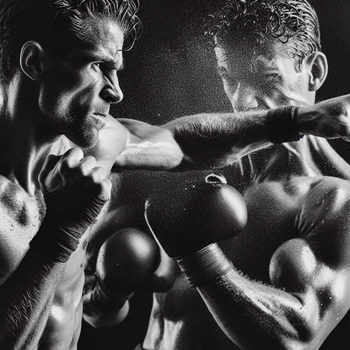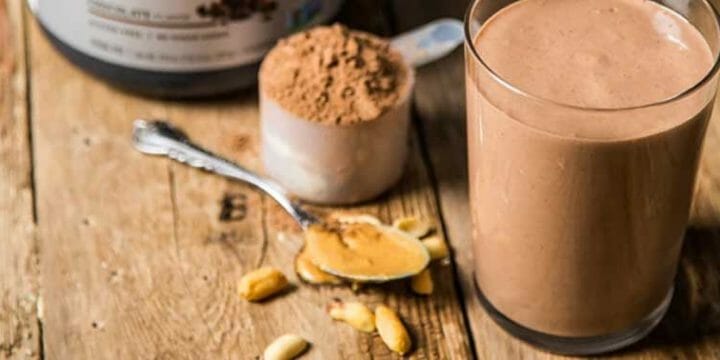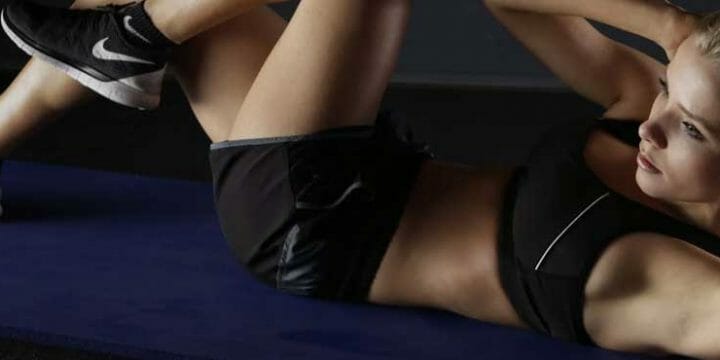I'm sure you've seen guys hanging on the bar while receiving punches in the stomach at the same time. If you've wondered whether punching a bag builds muscle or not, you're not alone.
I've never used this method in all of my years as a fitness trainer, but I know some colleagues regularly do. So I decided to do a thorough analysis of this phenomenon as I wanted to determine for myself whether hitting abdominal muscles provides any benefits at all.
After reading all relevant articles I could find on this topic, as well as talking to a few MMA coaches I know, I came up with these insights.
Quick Summary
- Punching the abs doesn't necessarily make them stronger, but it can make them tighter and more capable of contracting under load.
- Strong abs are crucial for good posture, body stabilization, protection of internal organs, improved sports performance, and spine support.
- Abdominal bracing, a contraction around the spine, has been shown to improve spinal mobility according to some studies.
- While punching the abs might be a method used by some fighters, traditional exercises like crunches, planks, and leg lifts are more effective and safer for the general population aiming for strong abs.
Does Hitting Your Stomach Make Abs Stronger?

From my personal experience as a fitness trainer, I've observed that hitting the stomach doesn't necessarily make the abs stronger but does make them tighter. Strength, after all, is about how well muscles can contract under load.
Getting hit repeatedly will make the body respond by creating scar tissue. And the scar tissue is more rigid than the muscle tissue.
While some believe that punching the abs can help strengthen them, it's crucial to understand the potential risks. Injuries such as bruising, internal bleeding, or even more severe complications can occur if not done correctly.
However, light punches to the belly may also help improve the body's quick reactions, leading to fast-twitch ab muscles growth.
I believe exercises such as crunches, planks, sit-ups, and leg lifts with the aid of the best pre-workout for men could bring you the results you’re after.
"It teaches people to better engage in ab exercises and use the core muscles throughout."
- Tom Holland, Personal Trainer & Exercise Physiologist
Why Are Strong Abs Important?
Having trained numerous clients over the years, I've come to realize just how vital strong abs are. They truly form the foundation of core strength.
Core muscles may be our body's most important muscle group, possibly more important than leg muscles.
Muscular abs have numerous benefits:
- Good posture - may prevent unnecessary pressure on the spine
- Body stabilization - decreased risk of falling [1]
- Supported spine - lessen the risk of low back injury [2]
- Improve sports performance - may affect complex athletic movements execution [3]
- Protect internal organs - could prevent inner tissue traumas
With all these perks, six-pack abs (rectus abdominis) should always be a priority in workouts. Unfortunately, most people often neglect them and do abs training only as an extra.
Related Article: Best Workout For Abs
Why Do Martial Artists Do It?

There are several reasons why those athletes keep voluntarily taking punches in the stomach.
Stomach punches are dreadful, but it's part of their job to encounter punches.
Receiving body punches might prepare their abdominal area muscles for what's inevitable. By becoming tougher, abs get accustomed to external hits.
A feature that follows that routine is also desensitization. Repeatedly punching one area might make nerves less sensitive, which increases pain tolerance.
Related Articles: Does Boxing Build Muscle Mass?
Effects on the Mind
Stomach punching is also an essential factor in developing mental strength.
The mind gets 'used to' experiencing hits and becomes less anxious about it in a real fight. It will also develop specific behavior so that fighters won't look surprised after a stomach punch in a fight.
Stomach punches train an MMA fighter the breathing, the timing, and the coordination of contracting the abs as the fighter is catching a punch using abdominal bracing.
Abdominal bracing is muscle mass contraction around the spine that creates a rigid midsection, and according to some studies, abdominal bracing improves spinal mobility [4].
Does It Have Any Downsides?

From what I've seen in the gym, hitting the abs can have downsides, especially for those with an underdeveloped six-pack or if the exercise is done improperly.
Punching the abs with full force straight away must be avoided because you should gradually increase punch power so you can adapt.
With time, you will learn how to act (breath and contract) when receiving a body punch.
You firstly need to build strength in the midsection and then comes the light strikes, then harder ones with boxing gloves, and in the end, you may use a medicine ball.
Alternative Ab Strengthening Exercises
Opting for alternative exercises can be more effective and safer for strengthening the abdominal muscles.
Planks engage the entire core, while crunches target the upper abs. Leg raises activate the lower abdominal area.
These exercises have a proven track record for building abdominal strength without the risk of injury or discomfort associated with punching.
FAQs
Is Hitting Abs Every Day Good?
Hitting abs every day is not good. Even pro fighters avoid doing ab punches every day because it might weaken their constitution.
Does Punching Your Abs Burn Fat?
Punching your abs doesn't burn fat. Burning fat primarily depends on a calories-in, calories-out game. If you monitor your calorie intake and nutrition and combine it with cardio and strength workouts, it might trigger fat cells meltdown.
Is It Ok to Do Abs Five Times a Week?
Doing abs five times a week is OK if rest days are evenly arranged. Abs, like other muscles, need time for recovery. By hitting them five days in a row, you won't give them appropriate rest, even though they are one of the fastest recovering muscles in the body.
References
- https://www.mayoclinic.org/healthy-lifestyle/fitness/in-depth/core-exercises/art-20044751
- https://www.ncbi.nlm.nih.gov/pmc/articles/PMC6614774/
- https://www.ncbi.nlm.nih.gov/pmc/articles/PMC3109894/
- https://www.sciencedirect.com/science/article/abs/pii/S1050641106000848
About The Author
You May Also Like






